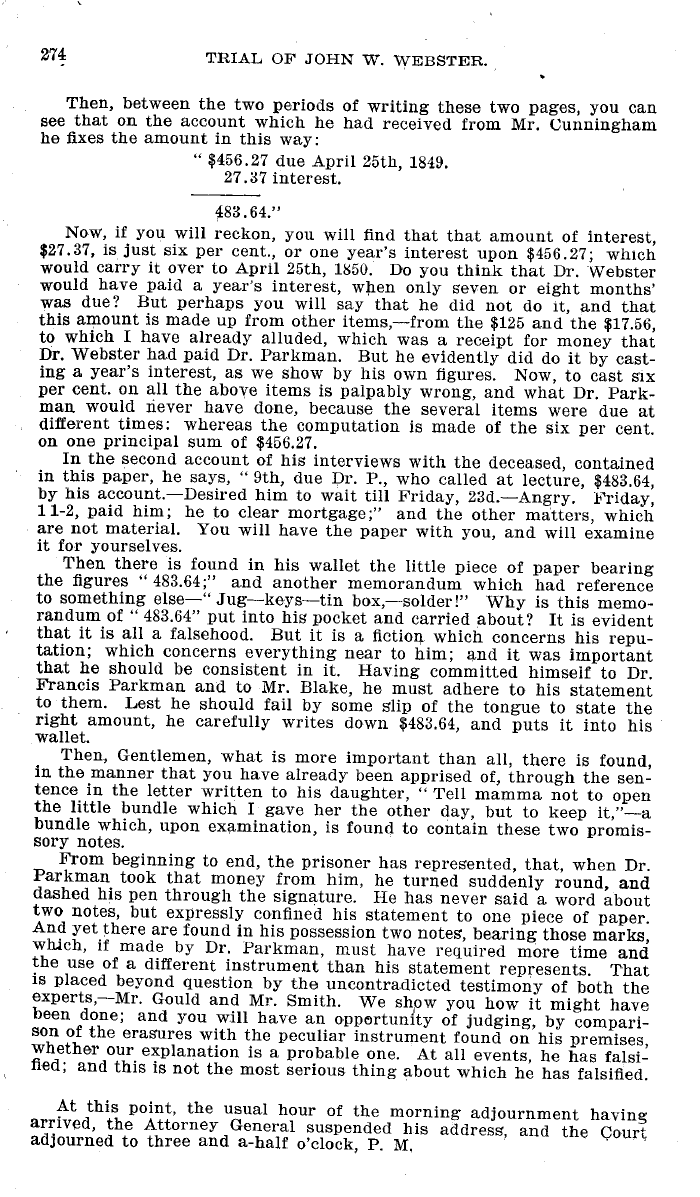|
274 TRIAL OF JOHN W. WEBSTER.
Then, between the two periods of writing these two pages, you can
see that on the account which he had received from Mr. Cunningham
he fixes the amount in this way:
" $456.27 due April 25th, 1849.
27.37 interest.
483.64."
Now, if you will reckon, you will find that that amount of interest,
$27.37, is just six per cent, or one year's interest upon $456.27; which
would carry it over to April 25th, 1850. Do you think that Dr. -Webster
would have paid a year's interest, when only seven or eight months'
was due? But perhaps you will say that he did not do it, and that
this amount is made up from other items,-from the $125 and the $17.56,
to which I have already alluded, which was a receipt for money that
Dr. Webster had paid Dr. Parkman. But he evidently did do it by cast-
ing a year's interest, as we show by his own figures. Now, to cast six
per cent. on all the above items is palpably wrong, and what Dr. Park-
man would never have done, because the several items were due at
different times: whereas the computation is made of the six per cent.
on one principal sum of $456.27.
In the second account of his interviews with the deceased, contained
in this paper, he says, " 9th, due Dr. P., who called at lecture, $483.64,
by his account.-Desired him to wait till Friday, 23d.-Angry. Friday,
11-2, paid him; he to clear mortgage;" and the other matters, which
are not material. You will have the paper with you, and will examine
it for yourselves.
Then there is found in his wallet the little piece of paper bearing
the figures " 483.64;" and another memorandum which had reference
to something else-" Jug-keys-tin box,-solder!" Why is this memo-
randum of " 483.64" put into his pocket and carried about? It is evident
that it is all a falsehood. But it is a fiction which concerns his repu-
tation; which concerns everything near to him; and it was important
that he should be consistent in it. Having committed himself to Dr.
Francis Parkman and to Mr. Blake, he must adhere to his statement
to them. Lest he should fail by some slip of the tongue to state the
right amount, he carefully writes down $483.64, and puts it into his
wallet.
Then, Gentlemen, what is more important than all there is found,
in the manner that you have already been apprised of, through the sen-
tence in the letter written to his daughter, " Tell mamma not to open
the little bundle which I gave her the other day, but to keep it,"-a
bundle which, upon examination, is found to contain these two promis-
sory notes.
From beginning to end, the prisoner has represented, that, when Dr.
Parkman took that money from him, he turned suddenly round, and
dashed his pen through the signature. He has never said a word about
two notes but expressly confined his statement to one piece of paper.
And yet there are found in his possession two notes, bearing those marks,
which, if made by Dr. Parkman, must have required more time and
the use of a different instrument than his statement represents. That
is placed beyond question by the uncontradicted testimony of both the
experts,-Mr. Gould and Mr. Smith. We show you how it might have
been done; and you will have an opportunity of judging, by compari-
son of the erasures with the peculiar instrument found on his premises,
whether our explanation is a probable one. At all events, he has falsi-
fied; and this is not the most serious thing about which he has falsified.
At this point, the usual hour of the morning adjournment having
arrived, the Attorney General suspended his address, and the Court
adjourned to three and a-half o'clock, P. M.
|

